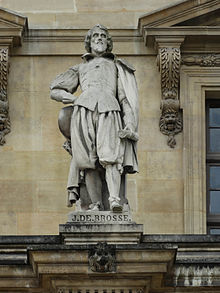Jean de Brosse
| Jean de Brosse | |
|---|---|

Jean de Brosse statue at the Louvre, Paris, France.
|
|
| Born | 1375 Huriel, France |
| Died | 1433 (aged 57 or 58) Boussac, France |
| Allegiance | France |
| Rank | Marshal of France |
| Battles/wars | |
Jean de Brosse (1375–1433), Lord of Boussac, Sainte-Sévère, Huriel, and Perugia, was a councillor and chamberlain to Charles VII of France; he was made a Marshal of France in 1426.
Jean de Brosse was born in 1375 in his father’s castle at Huriel to Pierre II de Brosse and Marguerite de Malleval. In 1419, at 44, de Brosse married Jeanne de Naillac.
De Brosse began fighting for France alongside his cousin, Louis de Culant. Probably through the influence of his family, de Brosse was made chamberlain to the Dauphin, the future Charles VII. The two soon became close friends.
In 1422 de Brosse’s father died, leaving his son his titles and estates. King Charles VI also died, and Charles VII took the title of king, though he was not crowned. Jean de Brosse and his wife had a son in the same year. They named him after his father.
On May 16, 1423 Charles VII charged de Brosse with ensuring his safety. Then on the 14th of July, 1426, de Brosse was made a Marshal of France. He fought the English and their allies at the side of La Hire, Jean de Dunois, Jean Poton de Xaintrailles, and Arthur de Richemont. He soon began growing short of money, however, due to work on the castle of Boussac and the cost of his army. The French government was unable to compensate de Brosse for his service, being short on money themselves. He resorted to selling off his crockery, silver, and his wife’s jewelry. He also freed the inhabitants of Boussac from his rule, in exchange for money.
In 1428 de Brosse took part in a rebellion, however it was soon squashed and the rebels locked up. However, since the king desperately needed generals, they were granted clemency.
De Brosse was among the French leaders who attempted to repel the English advance, however they failed, and in 1429 the English arrived at Orléans. Joan of Arc tried to get the king to send her, and with the urging of de Brosse, the king was convinced and sent Joan under the escort of de Brosse and Louis de Culant. The king also sent troops with them who joined the main French army. Under the leadership of Joan of Arc, the French won the Siege of Orleans. Because of his services, de Brosse was given a place of honor at the coronation of the king.
...
Wikipedia
